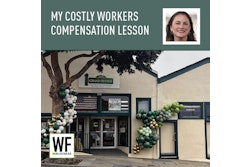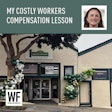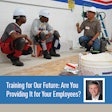

When you're in charge of running a hardwood flooring company, it's easy to convince yourself that playing it safe is the responsible choice. But the truth is that risk avoiders are also opportunity "missers." Hoping housing market conditions will improve or more customers will pick up the phone is a weak approach. You can't wait for everything to be perfect, because it never will be. You have to accept risk and make things happen. Following are 10 common risk avoidance excuses—do you see yourself in any of these descriptions?
Excuse 1: Timing
"The timing isn't right." Business plans sit in boxes or on hard drives as their creators wait for the right conditions: more funding, free time, better economic conditions. Plenty of businesses remain less successful than their leaders would like because they are hoping that conditions tomorrow will be just a little bit better. In addition, many leaders fail to solve problems or correct mistakes because, in their minds, the timing isn't right.
Excuse 2: Repeat Failure
"I tried that once, and it didn't work." Those words are often uttered regarding marketing. Perhaps you allocated a large sum to producing a television commercial but barely noticed any increase in your business. Your one-time marketing failure has convinced you not to try again. Yes, marketing can be expensive, and it's hard to predict how customers will respond. But without proactive long-term and consistent marketing, businesses die. Not marketing is a risk you can't afford.
Excuse 3: Too Low-Tech
"If I just had the latest supply chain management software, my company could fill orders faster." Many "If I just had…"s involve technology. You can spend forever waiting on the next best thing, and often that thing isn't as necessary as you thought. When the Internet goes down, everyone asks: "What should we do now?" If you were on a deserted island, would you starve or figure out how to survive? Countless success stories have been written with ink and paper, a rotary phone and determination; tools do not guarantee success.
Excuse 4: Planning
"I'm working on the plan." You want to reach the next level, whatever that is for your business. You begin planning and preparing for every possible scenario. You define contingencies with backup plans full of redundancies. But while your perfect plan might prevent you from failing, it will also prevent success if it's never executed. Planning is a good thing, but for many leaders, the solution to avoiding risk is to keep planning.
Excuse 5: Moving Targets
"It's a good idea, but circumstances have changed." Moving the target changes the goal of your business and delays plan execution—each time you move the target you have to stop and prepare to fire again. It's possible to spend an indefinite amount of time making excuses without accomplishing anything.
Excuse 6: Productive Busywork
"I'll get to it eventually." In my book, I tell the story of a salesperson who did extensive research on each sales lead she got. Some of her research files contained more than 100 printed pages of material. On the surface, this dedication to being prepared sounds admirable. But in reality, she was afraid of being rejected after making her pitch, and her research was a form of risk avoidance.
Excuse 7: Playing Defense
"I'm playing a defensive game." The hardest risks to take are often financial. Many leaders choose to cut costs and (try to) do more with less when they really need to hire new talent, invest more in marketing, upgrade their machinery or something else. No business achieves greatness solely by pinching pennies, and nobody wins without picking up the ball and running despite the obstacles.
Excuse 8: Stalling at Success
"Nothing's broken, so why fix it?" When you're facing a crisis that could damage or even sink your business, it's (fairly) easy to take risks, since if you don't act, you're doomed. But what about when things are going smoothly? It's easier to convince yourself there's no need to tamper with the status quo, but that thinking could make you irrelevant. Customers don't always leave because they had a bad experience; often they simply had a better experience with someone else.
Excuse 9: Silence
"…crickets chirping, dust falling, grass growing.…" That's the sound of silence. It's what you hear when you decide to let a project or initiative die over time. Maybe you're afraid of being held accountable, or you simply don't want to put in the effort, so you let projects peter out instead of driving them forward or putting them out of their misery. (You may even fool yourself into thinking others don't notice that you talk a big game but don't deliver.)
Excuse 10: Progress Paralysis
"But I don't avoid risk!" Even if you have conquered your fear of risk and can move into uncharted territory without hesitation, progress paralysis might still affect your company through the action (or inaction) of your employees. Your salespeople might be stuck in the comfort zone of creating safe, but boring, pitches, or your ad designer might be creating a backlog because she's a prisoner of perfectionism. If you as the leader don't take ownership of your team's counterproductive behaviors, you could miss out on opportunities.
Risk avoiders live in a false reality. The temporary comfort they gain from rationalizing their inaction just postpones the inevitable. Hoping that something will change will result in defeat. Success comes only via constant forward progress, which requires making something happen. As a leader, your example of enthusiastically seeking opportunity to execute, improve and deliver results will be the beacon that guides all who follow you. So stop avoiding—and start acting.
































